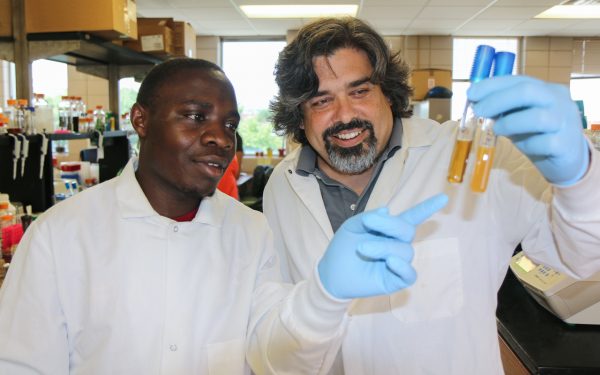LAS scientist receives NSF CAREER award; aims for big discoveries in the small universe of microtubules and protein isotypes
Author: las-digital
Author: las-digital
Mohan Gupta spent the last two decades working as an intracellular detective of sorts, investigating microtubules and exploring how their various tubulin-protein configurations—or isotypes—may impact the many jobs that microtubules perform in our cells.
“From the time we’re a single cell until the time we die, microtubules are everywhere inside of us, mediating trillions of processes,” said Gupta, assistant professor in the Department of Genetics, Development and Cell Biology. “Microtubules are critical to the existence of all plants and animals. It’s impossible to function without them.”
Microtubules provide structure to our cells and play vital roles in intracellular transport and cell organization. Their highly dynamic and polar nature enables them to shrink, lengthen and self-organize into various forms—such as microscopic highways on which motor proteins travel or delicate spindles that carry out cell division.
“Our research is focused on studying how microtubules can perform this diverse range of cellular processes; and also discovering how isotype variations may influence or even control some microtubule functions,” said Gupta.
Award-winning research
The promise and potential of this foundational research has earned Gupta a 2019 Faculty Early Career Development (CAREER) award from the National Science Foundation (NSF).
“The CAREER award is one of NSF’s most prestigious honors, supporting faculty members early in their career who also serve as exemplary researchers and teacher-scholars,” said Rita Miller, a program director at the National Science Foundation. “Dr. Gupta has been a pioneer in developing new protocols to study microtubules that has allowed a whole set of new discoveries to be made.”
Cracking the hidden code between isotypes and microtubules could spark significant advances that deepen our understanding of diverse biological processes. Furthermore, Gupta’s research could someday lead to the development of strategies for treating a wide range of conditions, including cancer, nervous system disorders and infertility.
“We are honored and grateful that the National Science Foundation, the nation’s foremost champion of fundamental research, is supporting our work,” said Gupta. “The study of tubulin isotypes is an understudied and emerging research area that has only recently gained steam. This leaves the door wide open for intriguing and exciting breakthroughs.”
Enhancing scientific literacy through outreach
Gupta’s $1,115,426 CAREER award was granted through the NSF’s competitive Molecular and Cellular Biosciences Division. The funds will support basic research, as well as the cost of education and outreach efforts that target high school and college students.
Designed to broaden the reach and impact of this research, Gupta will develop experiential learning activities for students in Science Bound, Iowa State’s premier program that empowers Iowa students of color to pursue STEM careers.
Gupta will also create curricula for a series of one-day lab visits for middle and high school students who will be transformed into junior researchers as they learn about microtubules, inspect live cells under a microscope and participate in research that is engaging and fun. The CAREER award will also fund several paid summer research jobs for undergraduate students in Science Bound.
“Each of these students will be immersed in and exposed to NSF-funded research,” said Gupta. “All of them will learn research techniques and gain insight into how compelling and rewarding a research career can be.”
In addition, Gupta and his lab team will partner with The Sky is the Limit, an Iowa State learning community that unites teams of open-option students under shared common interests. Open option students are first-year students who have not yet declared a major. This science-based section will serve 30-40 students who want to learn about research that uses model organisms, such as the yeast cells that Gupta studies.
These students will meet weekly, with occasional visits to Gupta’s lab.
“This will be a great opportunity for the graduate students on my research team who will help build and administer the curriculum,” he said. “We’ll create a very interactive, research-focused learning community at Iowa State.”

Gupta points out that some, but not all, open-option students will pursue science-related careers or majors. Many will go on to study science as well as non-science disciplines across the university. “One goal of this learning community is to nurture an interest in science while growing a scientifically literate citizenry that cuts across many careers and areas of expertise,” he said.
“We want the general public to understand the importance of supporting basic research and the National Science Foundation, while learning that model organism studies are worthwhile, valuable and can lead to important scientific discoveries,” said Gupta.
Research opportunities
After studying microtubules for 20 years, Gupta is “thrilled, humbled and excited” that the NSF will fund his research until January of 2024.
He’s quick to note that Iowa State’s commitment to supporting high-level research steered him to Ames four years ago and also played a pivotal role in his team securing the CAREER award.
“This NSF grant would not be possible without the solid research-oriented culture that exists at Iowa State and in my department,” he said. “This university has all kinds of research happening here and it’s all appreciated for its importance. I’m fortunate to work for a university that supports research for the sake of research.”
Gupta describes his focus on studying microtubule isotypes as “taking a research road less traveled.”
“Isotypes have been difficult to study. In many ways, research in this area is just beginning,” said Gupta. “However, that’s what makes the work so fulfilling and compelling, and our team is looking forward to the challenges and discoveries that lie ahead in the next five years.”
Visit this NSF link for more information about Gupta’s research and the NSF CAREER award.